#united musicians and allied workers
Text
hey y'all, since it's spotify wrapped season, can i beg a moment of your time? no, im not about to get on a soapbox about spotify. spotify sucks but that's not what i want to talk about.
did you know that most recording artists in the united states don't have the legal right to organize a union? some musicians are unionized as part of SAG-AFTRA or the American Federation of Musicians (for instrumental musicians), but lyricists and composers are classified as "independent contractors." This decision was handed down by the national labor relations board in 1984 and has not been overturned.
this means that musicians cannot organize or negotiate for better deals from, for instance, spotify, without the threat of being sued due to antitrust laws. musicians who are not represented by a major label or who are not part of a large musical organization such as an orchestra have very little bargaining power. source
fixing this situation will take a lot of work -- there's not a single easy solution. but in an era where we're seeing union growth and historic labor wins, i think now is the time to dream big. musicians need to organize ourselves on the ground to create collective power. we also need wider political interest and momentum around the necessity of musicians' rights.
this isn't time for you to say "yea im never gonna pay full price for music, sorry" or "musicians just have to accept that the market's saturated and devalued." this is time for us to try to envision a music industry where artists can be compensated for their creative labor and music can still remain accessible and easy to discover. changing the labor situation in the united states is just one piece of changing a global music industry, but it could have a big impact on the future.
if you're in the united states, there are two active efforts that you can ask your representatives to support -- one congressional bill introduced by Deborah Ross, and a resolution introduced by Rashida Tlaib.
H.R. 5576 - Protect Working Musicians Act of 2023 - sponsored by Artist Rights Alliance
H.Con.Res. 102 - Resolution for a new Streaming Royalty - sponsored by United Musicians and Allied Workers
i know there is so much to organize around right now. but if you're in the united states and have predominantly used spotify this year, or posted about spotify wrapped, please take a moment to send a message to your representatives about these bills. all you need to do is fill in your info, the letters are already written for you.
and please share this widely. thank you!!
#musicians#musicians of tumblr#spotify#spotify wrapped#labor rights#labor organizing#labor unions#united musicians and allied workers#artist rights alliance
314 notes
·
View notes
Text
Spotify is trying to get out of paying independent artists...
Next year they plan to change their rules to instate a 1000 stream/song/year cutoff under which songs will not make money at all. Worse, if the song doesn't reach 1000 within a month they will not pay EVER for that month even if it makes it to 1000 the next day.
These may not seem like huge amounts per artist but it adds up to millions of dollars and sets the precedent of not paying artists for their work. They will not stop here without a fight.
Shameless hypocrisy from me:
So why did I link a Spotify playlist? Those are my tracks with under 1000 plays this year* 🤣 Maybe you'll find something you like and we can keep the fractional cents flowing 💖💸💰
I have 21 000 streams this year from thousands of awesome people like you - I am not far in this journey but am well into the top 20% on the platform, so you can imagine how many artists are going to get nothing at all.
What you can do
If you want to help artists buying on Bandcamp is the most direct option. For streaming I can vouch for Tidal being a platform with better payout rates, better sound quality, and a smoother interface - not perfect but a lot closer. If you're willing, there's a petition in the above link I think.
If you are a musician and want to stand up, join UMAW. They are a new international union, the first representing artists and music workers in the new digital era. They already have impressive wins including getting Ticket master venues to stop taking merch cuts and improving pay at SXSW, a top US festival. They have sliding scale dues including potential exemptions for artists who can't yet afford 3 dollars a month (a thousand streams in Spotify terms). And we get to be in the same union 😉💖
Going forward I don't know if I will remove my stuff or what. I don't want my music unaccessible to my fans and that is the largest platform by far. I would love to hear what you think. I just know that I am privileged to be able to afford to make music and don't want to see this becoming even more closed off to the vital voices that haven't got funds or support. Between AI and streaming, one wonders if musicians will even exist in the future - let's keep the future full of dancing and merriment instead of this technofeudal nightmare the Daniel Eks of the world want to embrace.
*Noella might seem like a lie since it lists well over 1000 streams on my profile, this is the album version though and that's the single.
#Sorry long post#Probably not good to admit how many of my songs don't qualify#spotify#indie rock#glam rock#lady charles#musician#nonbinary musicians#manic pixie dream world#UMAW#United Musicians and Allied Workers#Union strong#genderfluid#nonbinary
46 notes
·
View notes
Text
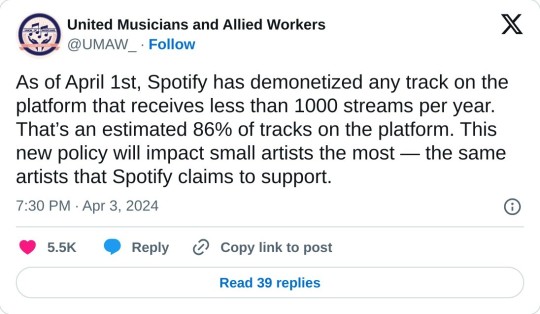
Not an April Fool's joke.
#Spotify#fuck Spotify#umaw#United Musicians and Allied Workers#music union#union#capitalism#corporate greed#greed#stream#streaming#streaming platform#time to switch to#Apple Music#Bandcamp#TIDAL#Daniel Ek#twitter
3 notes
·
View notes
Text
La Neve Interview: Trying to Slow Down History

Photo by Alycia Kravitz
BY JORDAN MAINZER
Any project from Providence-based musician, historian, and activist Joey La Neve DeFrancesco begins in their roots in organizing. The popular punk band Downtown Boys started when DeFrancesco met lead vocalist Victoria Ruiz while working at the Renaissance Hotel in Providence, the two becoming involved with a hotel worker’s union. While their project La Neve is far more dance-oriented than Downtown Boys or even DeFrancesco’s electronic project with Ruiz, Malportado Kids, it’s still very political. And on La Neve’s new EP History Solved, DeFrancesco explicitly connects the dance floor to the streets. With drummer Karna Ray, DeFrancesco explores a punk ethos, an aesthetic of distorted, shouted vocals and industrial new wave beats. Opener “Soft Power” combines swirling synths with calls to “multiply” and “emasculate”, stripping the patriarchy of its power. The title track takes on the interconnectedness of global catastrophes--from the evils of capitalism DeFrancesco has spent their life fighting to the global pandemic that’s upended the lives of countless musicians--with a loud-quiet-loud industrialism. “Rough Music” rides clattering drums, washy noise, and limber bass to an 80s-esque rave up; the title refers to a classic form of street protest against a local political figure, often using lots of percussion, something akin to DeFrancesco’s time in brass band What Cheer? Brigade.
Knowing they wanted to blend live percussion with digital elements on the new La Neve material, DeFrancesco reached out to Marco Buccelli, the drummer for Xenia Rubinos, who had played with Downtown Boys. Ray had also worked with Buccelli and recommended him, and DeFrancesco was especially impressed with Buccelli’s work on Rubinos’ most recent album Una Rosa. Though the seeds of History Solved’s title track were planted pre-pandemic, DeFrancesco wrote most of the EP during the pandemic and recorded it with Buccelli in upstate New York last summer. Listening to it in all of its rawness, it’s clear DeFrancesco yearned for the live performance of these songs. La Neve played AS220′s Black Box Theatre in Providence in March; they describe their show as part drag, part mosh pit, and part rave. They’re also doing a release show for History Solved at Trans-Pecos in New York on May 7th.
I spoke with DeFrancesco over the phone last month about History Solved, rough music, their involvement in various labor movements, and working with mastering extraordinaire Heba Kadry. Read our conversation below, edited for length and clarity.
Since I Left You: What makes History Solved unique as compared to past La Neve releases?
Joey La Neve DeFrancesco: It’s definitely more intense and chaotic and punk. Coming from Downtown Boys, with La Neve, at first, I was trying to do more of a dance or house thing. I still do some of that on this record and still like playing that live. But this is much more transparently angry and aggressive and cathartic, coming out of a pandemic mindset. Some of it was coming out of visualizing what the music would be doing to people in a live context. Some of the most fun parts of doing this job are performing live, and for those couple years [during COVID], it was unthinkable how you could have a packed sweaty dance situation. I wanted to make something to capture those particular emotions and politics. It’s much faster, much more in this digital punk vein. Closer to Downtown Boys than the last record I did.
SILY: Did you have the album title or the title track first?
JLND: I don’t think I came at it thinking what the title of the record was gonna be. I think I wrote that song first or began working on it first. It felt like the last couple years, the way people had observed how time had been feeling, it felt like we were living in an accelerated experience of history and of things around us. It felt difficult to feel like we had much agency as a collective to slow down or influence these machinations of history around us. It felt like a particularly meaningful time, and I came up with it before the pandemic. It’s a line from Marx in the literal sense, but I took it to mean something different. I also like how the line sounds aesthetically. It seemed to fit what I felt was going on around me pretty accurately.
SILY: Do you think the idea of “Rough Music” is a good descriptor of this album in general?
JLND: [laughs] Yeah, it’s definitely rougher [than past La Neve material]. I’ve worked in museums and writing history as another one of my jobs for a while, so I have these nerdy historical references in a lot of my songs. Marx isn’t that nerdy of a reference, it’s more popular. But “rough music” is an old labor thing referring to working class parades where they would play music and mock a boss or someone with a lot of power in the community. So it works as a double meaning in the song, trying to mock that class of people, but the literal aesthetic of it is a little broken, punk, loud, messy, and sloppy in a lot of places.
SILY: Obviously it relates to your personal history in labor movements, too.
JLND: I met Victoria because we were working at the same hotel and had become involved with UNITE HERE!, a hotel workers’ union, which is what the band came out of. I worked with other labor campaigns to organize independent musicians into the Union of Musicians and Allied Workers, which put together the biggest collective campaign against streaming services that’s out there. It’s definitely how I see the world and how I think is the best shot at changing things, from a labor perspective. I think about it especially as a musician. You organize where you work, and musicians are not especially organized. For me, it’s to get some of the messaging into the music but also organize as a music worker within the industry itself.
SILY: A lot of the recent anti-Spotify conversations have centered around their allowance of...certain anti-vaccination podcasts. As someone who fights streaming services from a different angle, do you think that distracts from the conversation?
JLND: I think if people want to do that and can do that, it’s fine. It’s gotten a lot of attention to the issue and brought a lot of people into our organizing campaign. But I don’t think it’s sufficient to actually change things and get to a level we can build power as music workers and organize collectively to put pressure on Spotify in a mass organized way, if we’re really gonna influence anything. Spotify has essentially a monopoly power. Streaming is 83-90% of profits in the music industry, and Spotify controls about 40% of that. It’s like what Amazon had in retail a few years ago. The only way you confront a level of monopoly and power like that is to collectively get organized to put pressure on the industry. The last big effective national musician’s strike was in the 1940′s and had 150,000 musicians in the American Federation of Musicians and went on strike for 2 years to win some concessions from the recording industry. We’re far away from being that organized today, but we can get there. It’s possible to do. That’s what our campaign is about. Building power to where we can force concessions from these companies.

SILY: Changing gears: Aesthetically, “Precious Gem”, the final track on the EP, seems like a bit more of an outlier. What’s the story behind that song?
JLND: That was written a bit earlier than the other stuff. We debated whether to include it on the EP because, like you said, it’s not quite a mesh to the rest of it. But I still wanted to put it at the end because I love dance music and dancing. It’s what brings people together at the shows. Even though it’s different stylistically, working with Marco, we did a cool job blending the digital and live music elements. There’s still a lot of weird stuff we managed to fit in there sonically and rhythmically. We wanted a closer at the end that was a slightly different style. The project has been morphing stylistically pretty rapidly; it’ll probably never stay in the same place, even on the same record.
SILY: Was this your first time working with Heba Kadry?
JLND: Yeah! I’ve come to know her over the past couple years because she’s been quite involved in the musician union efforts. We had a conversation that was recorded with Congresswoman Rashida Tlaib. She’s amazing and has worked with a lot of incredible artists and is politically really aligned with everything we’re doing. So it was very exciting she wanted to do the record. Everyone on the record has been involved in the musician union stuff, actually. It’s been really cool to work with people who are politically aligned.
SILY: I feel like I see her name on every single record’s credits.
JLND: Yes. She’s a powerhouse and very busy and has very good taste in who she wants to work with. I’m honored she agreed to do the project with us.
SILY: How did your show at the Black Box go?
JLND: It was great. I got to play with Abdu Ali, this Baltimore club legend who Downtown Boys and me and Victoria’s other electronic band Malportado Kids had played with in Baltimore. We’ve brought Abdu up here and have been on the circuit with Abdu Ali for 7-8 years. I hadn’t seen them since the pandemic, so it was really exciting as a fan to see Abdu perform because they’re one of the best performers in the game. It was cool to get in there and have people dancing face to face with me. It felt a little bit rusty in terms of approaching the performance. Some of it’s like riding a bike, and some of it takes a certain level of practice. It’s still gonna be weird for a long time, but it’ll be exciting to be able to do it again.
SILY: Have you been to many other shows?
JLND: I went to see Mdou Moctar last month at the Columbus Theatre in Providence. I had never seen them live but had watched a lot of videos of them live, and it seems like they keep getting better and better as a live band. That was really inspiring. I’ve also seen some little shows here and there and been to the club when it seemed like COVID was behind us for a month or two. But Mdou Moctar was the time I felt again, “Wow! This is the power of live music.”
SILY: Did you play music from the EP at the Black Box?
JLND: Yeah, most of [it]. The only one I haven’t figured out how to do live is “Work to Rule” because it’s so heavily guitar-based and doesn’t do well with the backing track. I’d love to get to this point where the band can have more members in it, but it’s a difficult financial consideration to pay big bands of people. But overall people seemed to respond to [the EP].
SILY: What’s the story behind the cover art?
JLND: That’s a photo from the last La Neve tour we got to do right before COVID hit, in January of 2020. We did a West Coast tour and got to do a show in Reno at The Holland Project. I had never played in Reno before, but that was one of the most fun shows of the tour. There was a cool photographer there who took these double exposure shots of us throughout the night, named Rey Broughton. She had sent me a bunch of them. I said, “These are really amazing, I’d like to do something with them.” A couple years later, I had something for the image. It reminds me of getting to do that last tour and engaging with people in a place I had never been before.
SILY: Anything else next for you in the short or long term?
JLND: Hopefully some touring. Still chugging along writing music, so I’m hoping to write another set of things sometime soon. I feel like these days, it’s hard to think more than a few months in advance, especially in this industry. But the project continues. I’m continuing with the Union of Musicians and Allied Workers. We’re working with lawmakers on legislation right now to take on the streaming issue.
SILY: Anything you’ve been listening to, watching, or reading you’ve enjoyed?
JLND: I should be prepared for this question. I don’t want to just name all my friends.
SILY: You can!
JD: There’s an artist named Manchado in New York who just put out a new single. I’ve really liked their work for a while. They do this queer performance that’s strange and really pushing things. The song’s called “Mona Lisa”. There’s another band in New York I’m playing with on May 7th called Ratas En Zelo who I think are the best, most fun punk band in New York right now. In terms of reading, I do a lot of history work, so I’m always reading about 18th century history, especially in Rhode Island. There’s a really good book called The Black Carib Wars by Christopher Taylor, about people who lived in the island of St. Vincent who successfully repelled multiple attempts at invasion. Specifically, these events called the Black Carib Wars where the British were trying to invade the island of St. Vincent. They were amongst the last islands to successfully repel European influence for many years. It’s an event I didn’t know about so much, so finding stuff like that, that’s history that’s totally cut out of what we learned about, is cool.
youtube
#interviews#la neve#joey la neve defrancesco#as220#trans-pecos#UNITE HERE!#union of musicians and allied workers#the holland project#history solved#alycia kravitz#downtown boys#victoria ruiz#renaissance hotel#malportado kids#karna ray#what cheer? brigade#xenia rubinos#una rosa#black box theatre#heba kadry#karl marx#spotify#american federation of musicians#rashida tlaib#abdu ali#mdou moctar#columbus theatre#rey broughton#manchado#ratas en zelo
5 notes
·
View notes
Text

shared by the United Musicians and Allied Workers to twitter
keep up with UMAW news and join today! 🎶
#spotify#spotify wrapped#union strong#united artists and allied workers#umaw#babbles#first link is to their tweet the second is to their website :)
24 notes
·
View notes
Text
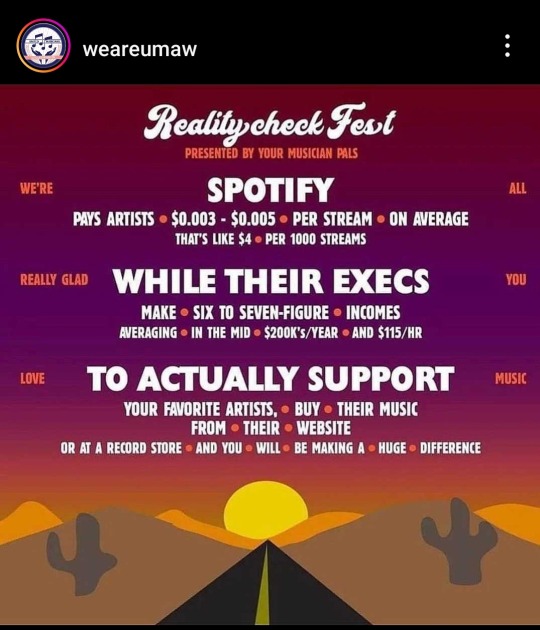
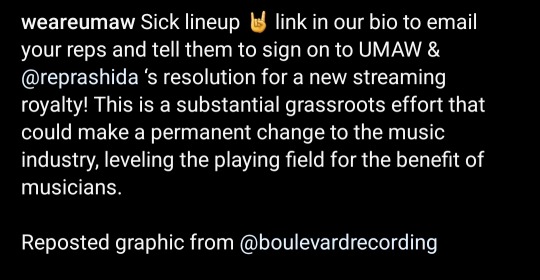
United Musicians and Allied Workers on Instagram
4 notes
·
View notes
Text
Spotify is planning to make changes to its royalties model early next year, Billboard and Music Business Worldwide report. The reported plans will impact artists who don’t generate significant streaming numbers, anyone accused of fraudulent activity, and anyone who uploads white noise or nature sounds.
The first proposed change to their royalties system requires for a song to hit a minimum number of annual streams before it will generate royalties. That threshold, which has not been announced or made clear, will reportedly demonetize songs that received 0.5% of the streamer’s overall royalty pool. According to MBW, that money will be redistributed through Spotify’s Streamshare royalty pot and pay out to more popular songs.
Another new change will be financial penalties to music distributors whose uploads are flagged for fraudulent activity. Non-music “noise” tracks—specifically mentioned are white noise and nature sounds—will require longer play times to generate royalties, though the specific length has not been made clear. It also hasn’t been specified how it will be determined if a track falls into that category.
When reached about the reported changes being planned, a Spotify spokesperson shared this statement: “We’re always evaluating how we can best serve artists, and regularly discuss with partners ways to further platform integrity. We do not have any news to share at this time.”
The United Musicians and Allied Workers union offered a reaction to today’s news. “Artists have solutions to fix streaming but Spotify isn’t listening,” the union shared on social media. “Instead they propose changes that will enrich the top of the pyramid even more, and make it even more impossible for working musicians to benefit from streaming.”
The Future of Music Coalition added: “This marks a serious shift away from how the service was pitched to the musician community at launch, as a level playing field that treated all tracks the same. Over time, Spotify has shifted further and further away from that pledge.”
3 notes
·
View notes
Note
Nick and Annie also mentioned this in a recent episode of their podcast, but it is worrying how many of the small music venues that are either struggling or have already closed down. It must be so depressing to be an upcoming/indie musicians these days and being faced with fewer options to perform and platforms like Spotify now making payment changes that further disadvantages them.
https://www.theguardian.com/music/2023/sep/30/small-uk-music-venues-struggle-to-stay-open-polar-bear-hull
https://www.theguardian.com/commentisfree/2023/nov/30/spotify-smaller-artists-wrapped-indie-musicians
https://www.theguardian.com/music/2023/nov/22/spotify-announces-royalty-changes
Anon 2:
Just saw this thread from United Musicians and Allied Workers, which highlights that Spotify’s new payment threshold will mean that 2/3 of the tracks on the platform won’t receive any payment at all in 2024.
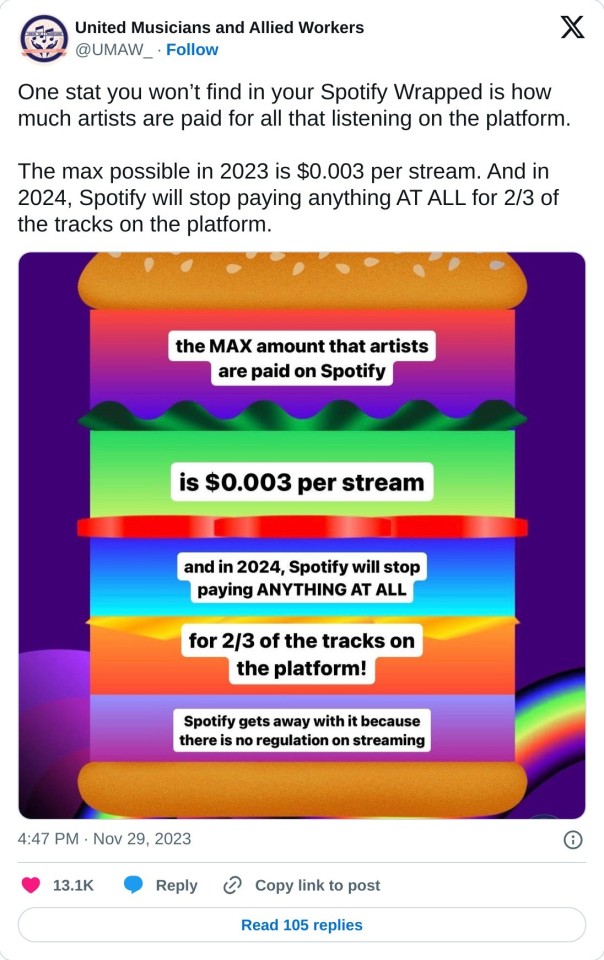
Thanks for bringing attention to all this anons. That stratification of the music industry - where the biggest artists are doing incredibly well and there's fewer and fewer people who are making a decent living. It is bad for workers, bad for culture, and bad for people who love music.
I hate that fan culture is one of the boosters to this form of capitalism. It's why I think it's important to emphasise that streaming (as opposed to listening to) your fave's music actively makes the world worse. I don't think fandom has to contribute to making the rich richer and the poor poorer, but I think it's important to acknowledge that as currently practiced it often does.
3 notes
·
View notes
Text
You can add your support at the link above.
The mechanism behind the Living Wage for Musicians Act is simple. The royalty would be funded through an additional subscription fee and a 10% levy on non-subscription revenue.
This money would be paid into an Artist Compensation Royalty Fund, which will then be distributed directly to both featured and non-featured artists by a non-profit administrator.
0 notes
Text
Tlaib Introduces Living Wage for Musicians Act
Congresswoman Rashida Tlaib (MI-12) and Congressman Jamaal Bowman (NY-16), founder of the Congressional Hip Hop Task Force, introduced the Living Wage for Musicians Act. Reps. Tlaib and Bowman previously introduced a resolution calling for economic justice and fairness in streaming. This legislation was created in partnership with United Musicians and Allied Workers (UMAW) and local and national…
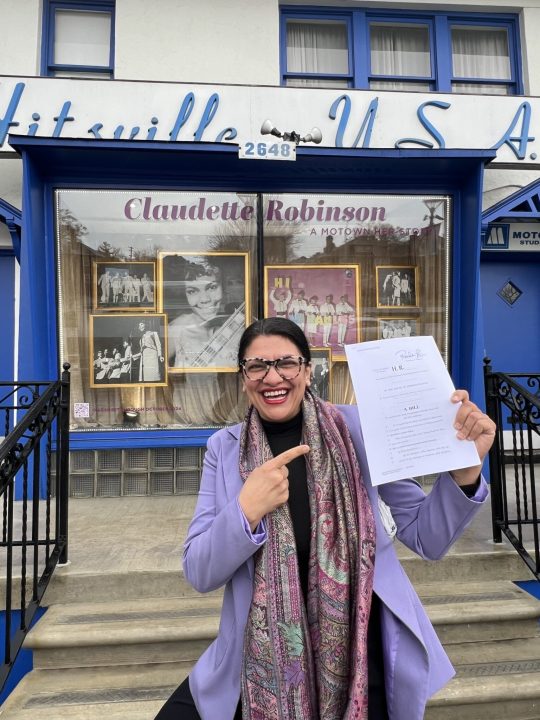
View On WordPress
0 notes
Text
Music workers create the enormous wealth that streaming platforms accumulate for their CEOs and investors year after year. But artists continue to be underpaid, misled, and otherwise exploited by streaming platforms. While artists experience declining wages and increasingly precarious employment, the music industry as a whole has reaped unprecedented profits, and CEOs of tech companies have become billionaires.
The Living Wage for Musicians Act is built to pay artists a minimum penny per stream, an amount calculated specifically to provide a working class artist a living wage from streaming.
1 note
·
View note
Text
The Mighty Mojo tracks of 2023:
The Bubble List
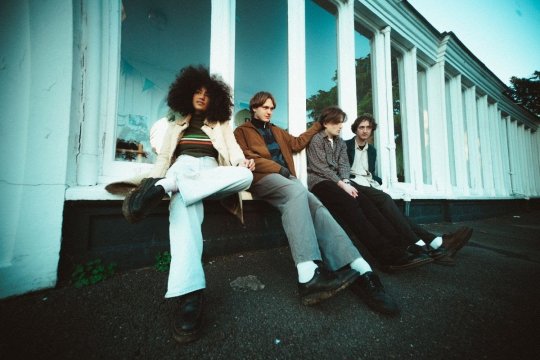
Being ahead of schedule is a rare treat in any aspect of my life, and for that reason I am embracing my decision to release the Bubble List so soon into December, and so far ahead of the Top 50 that will still be released on New Year’s Eve. Some traditions die hard.
In past years I’ve taken my obsession with capturing the year in its entirety to unnecessary lengths. The speed of other actual publications to crown the year’s best everything was always looked on with disdain, as I scoured my regular channels for new music like a desperate man scanning his phone for dealers at 4am.
The thought of missing a banger by going too early disturbed me, in large part to ‘The El Camino incident’, in which my favourite album of 2011 dropped in the first week of December. When RTJ3 appeared on Christmas Eve 5 years later with no warning, it seemed to confirm that I was right and everyone else was wrong. Well, this year, the darndest thing happened.
I realised that NO ONE ELSE CARES. I have yet to have someone call me up for a song appearing on my list in the wrong year, in the 13 years I’ve been putting this thing together. I need to chill the fuck out. And so I have.
The other handy element to releasing the Bubble list now, is that it comes hot on the heels of Spotify Wrapped, and the annual debate around streaming royalties. I say annual because that’s when everyone gets involved, but there’s been a steady undercurrent throughout the year of artists rebelling against the system to speak out. I have always been supportive of their stance - it’s disgusting to see the disparity in profits between the people who own the platform (and due to many undiscussed deals, this includes most of the major labels) and those who literally power it with their artistic endeavours.
And yet, I’ve always remained within this crooked system, simply because I believed it to be the only place to find the depth of music I was looking for. Last I heard, Tidal was still quite specific, and a lot of the others were only marginally better. And then there was the library of playlists that I’ve built up over the years, an encyclopaedia that I lean on heavily on a day-to-day basis. There’s a playlist for nearly every scenario my mind could possibly imagine, and that has a worth beyond currency.
I can’t ignore the fact that Spotify’s algorithms have also been responsible for exposing me to many of the people on this list. The sheer amount of Aussies that feature is testament to that, and again that’s only possible due to the buy-in of the music community. There are ways that Spotify is helping young artists. But it’s just not enough.
It’s still a bit of an eye-roller to announce your departure from something, but in this instance I’m going to indulge myself. I’m looking at other options, and I suggest you all do too. If you want more detailed info on the reasons why and the best action to take, follow United Musicians and Allied Workers on socials https://linktr.ee/umaw
*Steps down from soapbox* So, the music then. I really went deep into it this year, racking up over 120 songs in the long list by September. The best part of that is that it meant that I had a long time to live with these songs, sort them in my heart and allow the cream to rise naturally to the top. Aside from the Aussie invasion there’s no real trends - except more of a push to the extremes of comfort in sound. There’s some mad bits in here, and some initially jarring sounds that eventually connect, and when they do it’s all the more thrilling having taken you to the edge.
With so much to choose from it was easy to stay within the hardest boundary of the bubble list - outside the odd superstar feature, these are underground/new artists that aren’t widely known or available. In the wake of the streaming debate it feels more important than ever to shine this little light in their direction.
The full Twitter (Some traditions die hard) thread with links to socials and places to buy music/merch will come next week, and you’ll have the benefit of the whole of December to absorb it all before the next hit.
See you in a few weeks.
1 note
·
View note
Text
U.S.A. : Les musiciens sont eux aussi confrontés à des diffuseurs avares et à des menaces d'IA. Alors pourquoi ne font-ils pas grève ?
“Beaucoup de musiciens sont vraiment en colère en ce moment. Je reçois tout le temps des messages me demandant pourquoi nous ne sommes pas en grève. “, a déclaré M. DeFrancesco, guitariste du groupe de rock Downtown Boys et cofondateur du groupe militant à but non lucratif United Musicians and Allied Workers. “Les scénaristes et les acteurs sont en grève pour exiger des changements dans la…

View On WordPress
0 notes
Text
Getting UK Via for Artistic People
What does a creative person mean?
An individual who supports the UK's creative industries is referred to as a creative worker. Options for creative professionals in the cinema, television, music, comedy, and allied sectors are the main topic of this article. It can apply to performers like actors, musicians, and entertainers as well as people who work on shows "behind the scenes" such as camera operators, screenplay writers, and costume designers.
This page is a list of prospective visa choices, some of which may not be applicable to all occupations or sectors. You should consider these possibilities in light of your unique set of circumstances.
The primary routes open to Creative people by UK Immigration Lawyers in Dubai are:
Longer term
• Skilled worker (any duration)
• Global Talent (any duration)
Short term
• Visitor – Standard (up to six months, although typically shorter)
• Visitor – Permitted paid engagement (up to one month)
• Creative worker – Visa (up to 12 months)
• Creative worker - CoS concession (up to three months) *certain nationalities only
Visa for Global Talent
Talented and promising people in the arts and culture can travel to the UK to work for up to five years with the prospect of settling there through the competitive Global Talent visa pathway. A Global Talent visa may be a possibility if you are a leader ("exceptional talent") or a future leader ("exceptional promise") in the arts and cultural sectors and you want to work in the UK.
Applicants need to have Arts Council approval. You must have worked professionally and often in your industry for the past five years to be eligible for an endorsement. Typically, you need to have experience in your field in one or more nations.
The Global Talent Pathway consists of two steps. The "endorsement stage" of stage one evaluates your supporting materials in comparison to the established standards. You can move on to stage two, the "visa application stage," where you will submit a visa application, if you are successful in getting an endorsement. Those who have won one of the "Prestigious prizes" will be allowed to apply for a visa without needing an endorsement.
Visa For Skilled Workers
Creative professionals who have a job offer in a properly skilled capacity and with an acceptable pay from a Home Office authorised sponsor are eligible for the skilled worker visa route. Where there is a direct connection between the sponsor and the worker, such as an employer-employee relationship, it will be possible.
Editors, illustrators, actors, presenters, dancers, musicians, studio managers, producers, agents, photographers, sound engineers, graphic designers, etc. might all fall under this category.
The sponsor (company) will provide a Certificate of Sponsorship, a digital document that attests to the specifics of the position being offered. The candidate may then submit an application through one of the UK Immigration Lawyers Dubai for a skilled worker visa.
Temporary solutions
Visitor - Basic
The Visitor - Standard route permits brief stays in the UK, nominally up to 180 days each trip, for 'permitted activities' that cannot be construed as employment in the UK or paid labour in the UK. It must be obvious that the individual won't be residing in the UK, thus each journey will probably last far less time than the allotted six months. The applicant continues to reside and work outside of the UK, travelling there relatively infrequently.
Creative Worker Visa
The creative worker visa path is available to those creative workers who are particularly suited for the specific profession, such as via experience, a specialised talent, or for reasons of continuity. This path might include, for instance, a globally renowned dancer, a member of a unit company, an actor who is filming both within and outside the UK, actors who are involved in a production's financial support, a Producer or Editor, and so on. The pay for the employee must meet or exceed industry norms.
0 notes
Text
It's Bandcamp Friday: Bandcamp United Edition
As we usually do about this time of the month, I'm gonna encourage you to go splash out on Bandcamp purchases from your favorite artists, as Bandcamp waves their cut of sales and puts that money directly in the pockets of the artists/labels. I'll drop some of the stuff I'm copping in after I make another request.
The good folks over at Bandcamp United are Bandcamp employees that are currently organizing and making an effort toward a formal union. Ethan Diamond, Bandcamp's CEO and leadership at the company are currently engaging in union-busting practices. Given Bandcamp's status as a place that puts artists first, it would behoove Ethan to consider extending the same spirit of equity and fairness that they preach for artists to their own employees.
Before you cop anything from the site today (and you should, in addition to helping your favorites see more bread, the folks at Bandcamp United are encouraging you to do so as well), consider following this thread on what you can do to support unionization efforts.

That includes, writing a letter to Ethan Diamond asking him to halt union-busting and allow the employees to hold fair union elections. The BCU Ally Toolkit even has an example draft for what to say, but as they note certain keywords might get filtered out, so I took a stab of my own in an email that I sent yesterday:
Dear Ethan,
I've been a customer and evangelist of Bandcamp as a fair and equitable platform for musicians for years. Looking at my own personal collection, I've got over 400 titles from Bandcamp, and I've eagerly purchased music here specifically because it's one of the few internet storefronts left that seems to leverage itself to uplift the artists that use it, rather than the other way around.
With that in mind, particularly on the eve of Bandcamp Friday when I'm about to push plenty of my friends, family members, and followers to support their favorite artists via your platform, I'd urge you to also offer that spirit of fairness and equitability to your employees by not infringing or interfering with their right to form a union. Not only is it the right thing to do to honor workers who pour themselves into ensuring that artists are able to support themselves, it also reflects back onto artists. I can call out several bands and musicians by name who already cite Bandcamp as a lifeline and a beacon. If they could easily point to Bandcamp as a place that also empowers its employees to make decisions for themselves, they would no doubt be more comfortable with continuing to call Bandcamp home.
Thank you for your time,
And now, a smidgen of what I'm copping today:
High Bias, an album compilation from Backwoodz Studioz
Rat Saw God by Wednesday
i'm not supposed to be here by Illingsworth
Horseradish by Milc & goldenbeets
Visions by Marissa Nadler
As always, make good choices and support workers.
0 notes
Text
Deerhoof, Water From Your Eyes, Dan Deacon, and More Contribute to May Day Music: Listen
An Overlooked Tracks News Finding: Here’s an article you might have overlooked. Having a partnership with NewsAPI, we try to catch music entertainment news for you to view, read and possibly enjoy. We will continue to find what’s available in the world of music entertainment, concert information and music releases. But obviously you – the listener and reader are the biggest source for news in your area, so if you can share with us. For right now, look at what we found for you:
“From The Pitchfork Music Website – Deerhoof, Water From Your Eyes, Dan Deacon, and More Contribute to May Day Music: Listen”
Deerhoof, Water From Your Eyes, Dan Deacon, Pile, and more have contributed to a new compilation benefiting strike funds. It’s titled May Day Music: A Benefit Compilation For Strike Funds & Artists, and the 47-track collection includes other contributions from Empath, Palberta, Radiator Hospital, and Ryan Pollie. It arrives via Washington, D.C.’s Gardenhead Records. Check it out in full below.
The compilation arrives on International Workers’ Day, more casually known as May Day. Last year, Gardenhead assembled another compilation to benefit the youth-led climate-change organization the Sunrise Movement. Among recent unionizations at Starbucks and Amazon, artists and music industry employees have been part of a resurgent organized-labor movement in the United States, with the Union of Musicians and Allied Workers launching in the spring of 2020. Last March, Secretly Group employees announced their plans to form a union, and their contract is still under negotiation. Spotify and Gimlet employees had their first contracts ratified last April.
Read More Music Headllines
from WordPress https://bit.ly/3y4blGT
via IFTTT
0 notes